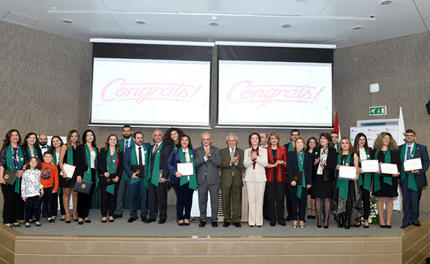LAU Awards Certificates to Graduates of Medical Simulation Program
The Clinical Simulation Center honors medical professionals who completed its one-year course.

Graduates of the one-year clinical simulation program comprised medical specialists from LAU and other Lebanese universities, as well as professionals from across the region.
“We need to be innovatively and creatively on the cutting edge of what we do,” LAU President Joseph G. Jabbra told an audience of medical professionals, their families, and LAU faculty and staff. “In the fourth industrial revolution, education is essential, but no longer sufficient.” Jabbra was speaking at the diploma ceremony for graduates of the university’s Clinical Simulation Center (LAU-CSC) program.
The 22 people honored at the event, which took place on November 25 at the Chagoury Health Sciences Center on the Byblos campus, were medical specialists from LAU and other Lebanese universities, as well as professionals from across the region, who had completed the course as part of their professional development and advancement.
The Clinical Simulation Program was established in 2009 to teach doctors, nurses and pharmacists new medical techniques using interaction with standardized patients and simulation exercises, such as practice on mannequins and other training devices, with the aim of promoting safe and effective patient care and advancing science.
“Going beyond procedural-based training, the center focuses on communication, decision-making and leadership skills that are necessary for today’s medical professional,” said LAU-CSC Director Dr. Vanda Abi Raad. “Training includes ultrasound techniques, surgical procedures, obstetrics, pediatrics, geriatrics, cardiac care and patient safety.”
The one-year program – organized in collaboration with Australia’s National Health Education and Training in Simulation Program (NHET-Sim) – was taught in three-day blocks to accommodate students who hold full-time jobs. Courses were led by Debra Nestel, fellow at the Academy of Medical Educators and professor of simulation education in healthcare at Monash in Australia; Guillaume Alinier, professor of Simulation in Healthcare Education at the UK’s University of Hertfordshire and director of Research at Hamad Medical Corporation’s Ambulance Service in Doha; and Jack Boulet, vice president for Research and Data Resources at the Foundation for Advancement of International Medical Education and Research.
Certified by the American Heart Association and recently accredited by the Royal College of Physicians and Surgeons of Canada, LAU-CSC was designed to support interdisciplinary learning of LAU students at the Gilbert and Rose-Marie Chagoury School of Medicine, the Alice Ramez Chagoury School of Nursing and the School of Pharmacy. It also serves as a resource for LAU Medical Center-Rizk Hospital and the larger healthcare community.
Dean of the School of Medicine Dr. Michel Mawad told the audience, “Medical simulation can reduce the rates of medical errors, which are much more common than we think. In addition to a good curriculum, it should play a role for students in real life when taking care of patients.”
Diploma recipients Dr. Rima Nasser, orthopedic surgeon and head of the Residency Program at LAU Medical Center-Rizk Hospital, and Dr. Salah Malas, doctor of Obstetrics and Gynecology, showed a short video of their experience in the program, highlighting the techniques they learned and demonstrating how they will apply them in their medical practice. This was followed by a ceremony during which the graduates filed across the stage to the tune of “Pomp and Circumstance” to receive their diplomas and green sashes.
“There is so much out there that can help us improve our ability to learn and to teach,” said Nasser of the benefits she drew from the course. “I think what happens sometimes when we become attending surgeons is that we don’t know the best methods to teach. I would like to start incorporating virtual-reality techniques and mannequins to do injections.”
For his part, Pierre Khalifeh, emergency room physician at St. George Hospital in Beirut, who also teaches medical students, said he sees “simulation as the main teaching tool of the future.”
“Simulation has begun to change much of the ways in which medicine is taught and how trainees and junior doctors acquire the relevant skills,” concurred Abi Raad. “Medical, nursing, and other healthcare students and staff now have the opportunity to develop and refine their skills, repeatedly if necessary, using simulation technology without putting patients at risk.”
More
Latest Stories
- Medical Graduates Showcase their Research Leadership
- To Dance Toward Tomorrow
- Six LAU Faculty Listed Among the World’s Top 0.05 Percent by ScholarGPS
- Lebanon’s Brightest Compete for LAU Engineering Scholarships
- This Summer: Robotics and Artificial Intelligence Summer School for Middle Schoolers
- Into the Psychology of Justice
- Alumnus Zak Kassas on Navigation, Spoofing and the Future of GPS
- Hearing Between the Lines

